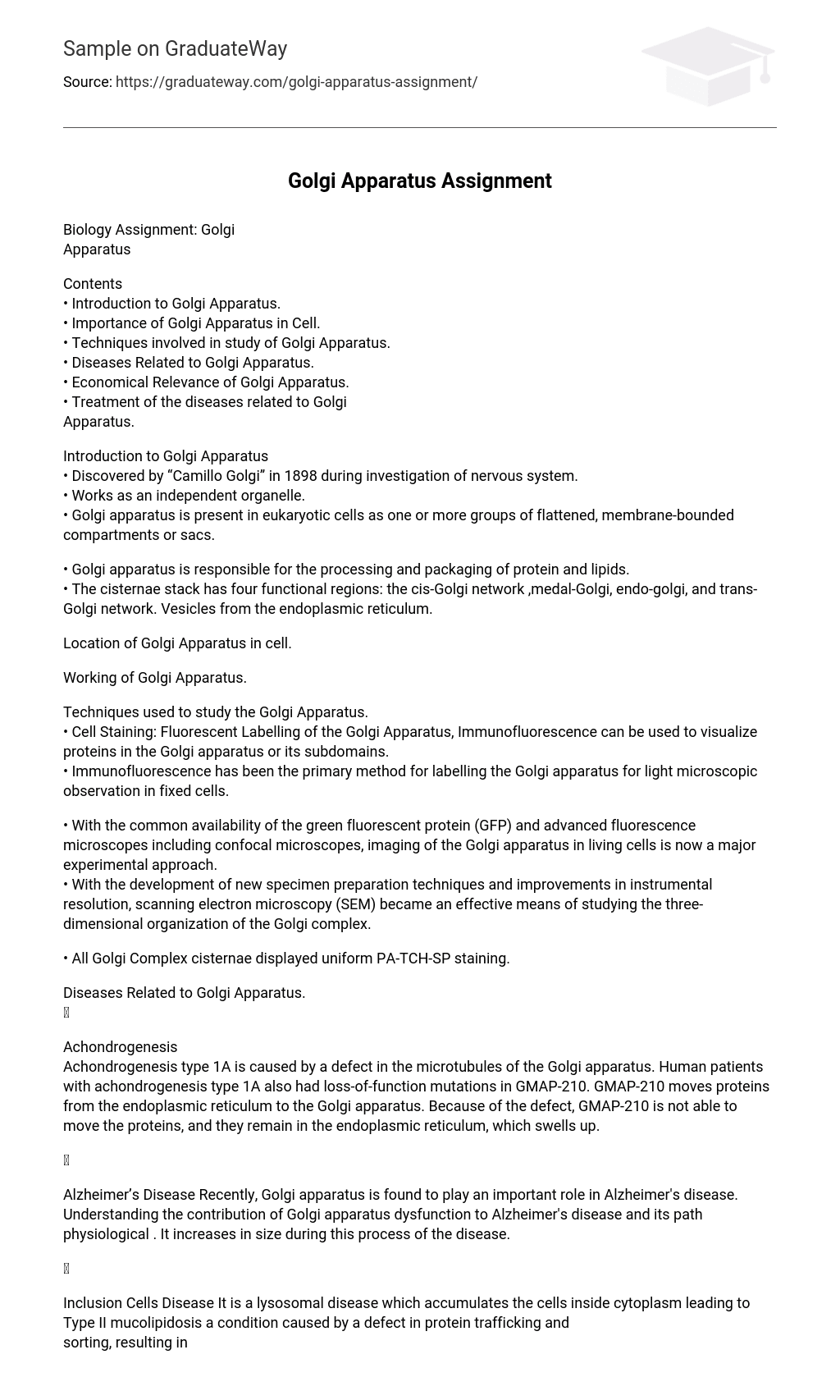Introduction to Golgi Apparatus
- Discovered by “Camillo Golgi” in 1898 during investigation of nervous system.
- Works as an independent organelle.
- Golgi apparatus is present in eukaryotic cells as one or more groups of flattened, membrane-bounded compartments or sacs.
- Golgi apparatus is responsible for the processing and packaging of protein and lipids.
- The cisternae stack has four functional regions: the cis-Golgi network ,medal-Golgi, endo-golgi, and trans-Golgi network.
Techniques used to study the Golgi Apparatus
- Fluorescent Labelling of the Golgi Apparatus, Immunofluorescence can be used to visualize proteins in the Golgi apparatus or its subdomains.
- Immunofluorescence has been the primary method for labelling the Golgi apparatus for light microscopic observation in fixed cells.
- With the common availability of the green fluorescent protein (GFP) and advanced fluorescence microscopes including confocal microscopes, imaging of the Golgi apparatus in living cells is now a major experimental approach.
- With the development of new specimen preparation techniques and improvements in instrumental resolution, scanning electron microscopy (SEM) became an effective means of studying the three-dimensional organization of the Golgi complex.
- All Golgi Complex cisternae displayed uniform PA-TCH-SP staining.
Diseases Related to Golgi Apparatus
Achondrogenesis type 1A is caused by a defect in the microtubules of the Golgi apparatus. Human patients with achondrogenesis type 1A also had loss-of-function mutations in GMAP-210. GMAP-210 moves proteins from the endoplasmic reticulum to the Golgi apparatus. Because of the defect, GMAP-210 is not able to move the proteins, and they remain in the endoplasmic reticulum, which swells up.
Alzheimer’s Disease Recently, Golgi apparatus is found to play an important role in Alzheimer’s disease. Understanding the contribution of Golgi apparatus dysfunction to Alzheimer’s disease and its path physiological . It increases in size during this process of the disease.
Inclusion Cells Disease It is a lysosomal disease which accumulates the cells inside cytoplasm leading to Type II mucolipidosis a condition caused by a defect in protein trafficking and
sorting, resulting in massive accumulation of intracellular and extracellular waste products, especially glycolipids. As the Golgi complex is responsible for packaging, sorting and distributing, this disease is caused by non functioning of Golgi body.
Congenital Disorders of Glycosylation As the process of addition and processing of carbohydrates takes place in Golgi, where a number of glycosyltransferases and glycosidase are involved in these reactions To date, there are several different types of CDG-I, all of which are due to genetic defects in enzymes involved in the generation of LLOs. CDG-II, on the other hand, involves malfunctions in the trimming or processing of the protein-bound chains in the ER and Golgi.
HGH Therapy
Inclusion cell disease. There is no cure yet for I-Cell disease/Mucolipidosis II disease. Treatment is limited to controlling or reducing the symptoms that are associated with this disorder. Surgery can remove the thin layer of corneal clouding to temporarily improve the complication.
Alzheimer’s disease. So basically there is no particular cure of Alzheimer which is more like a dementia. Physical activities and working on cognitive skills can help ameliorate it. Some
anti-psychotics are given but it does not work for all patients. Risperidone is anti depressant given to the Alzheimer’s or dementia’s patient.
Different Treatments of Alzheimer’s Disease
- Nutrition supplements
- Bone marrow transplant
- Lodging for follow-up care
- Follow-up office visits
- Home care, house cleaning following transplant
- Childcare
- Prescriptions
- Transportation and parking
- Telephone costs
- Over-the-counter medications and related supplies
- Donor search fees
- Testing of donors
- Compatibility test.
Latest Research About Golgi Apparatus
A biochemical approach was used to study the effects of alcohol on hepatic microtubules. Feeding of ethanolcontaining diets to rats decreased the amount of polymerized tubulin and the number of visible microtubules, and it also produced morphologic alterations of this organelle.
These micro tubular alterations were reproduced in isolated hepatocytes after incubation with ethanol. Pyrazole, an inhibitor of alcohol dehydrogenase , prevented these effects. Two oxidation products of ethanol, acetaldehyde and acetate, in concentrations likely to occur “in vivo” also reproduced the effects of ethanol on microtubules.
These findings indicate that ethanol oxidation alters liver microtubules; as a likely result, delayed secretion of export proteins ensues with early retention in the Golgi vesicles. After chronic alcohol feeding, there was also a significant increase in the volume of the cytoplasm, which could reflect retention of soluble proteins and water.
Despite what is known, there are still many unanswered questions concerning how this organelle—with its complex architecture and critical role in trafficking proteins—is inherited from mother to daughter cells. Understanding how the Golgi functions is important as this organelle may be linked to Alzheimer’s disease and a host of other protein and lipid storage diseases that are likely brought about by the effects of incorrectly sorting proteins and lipids in our cells.





